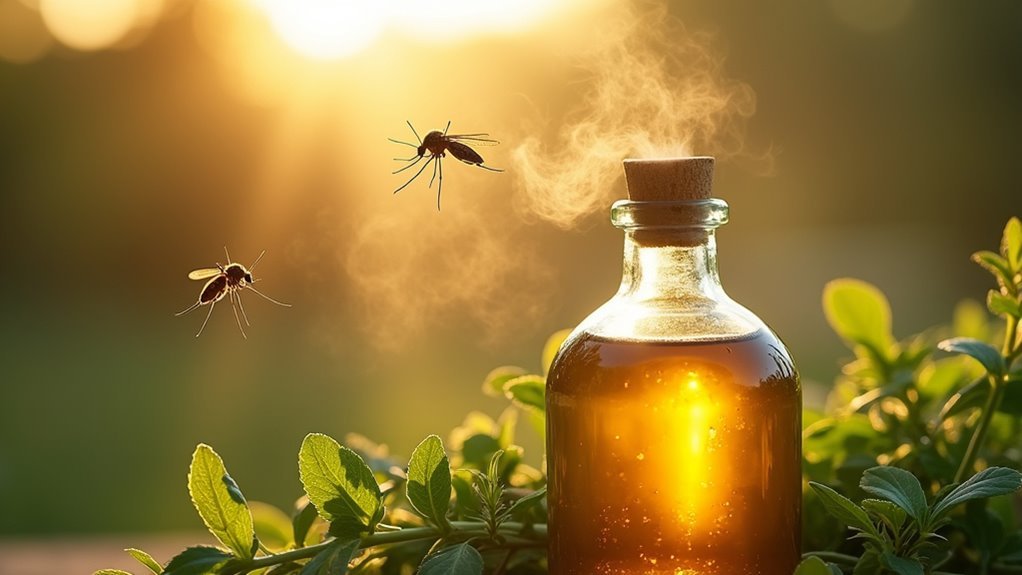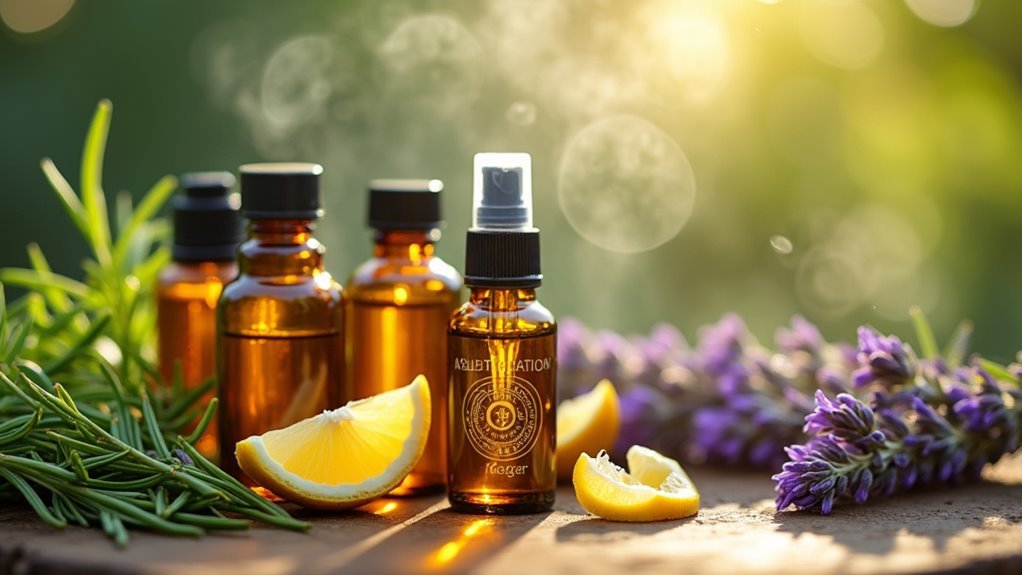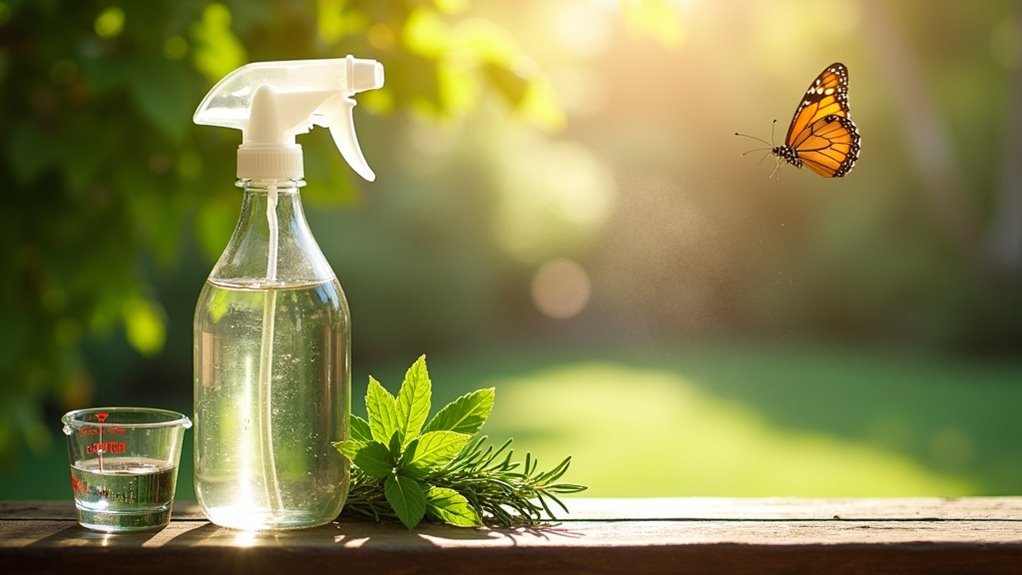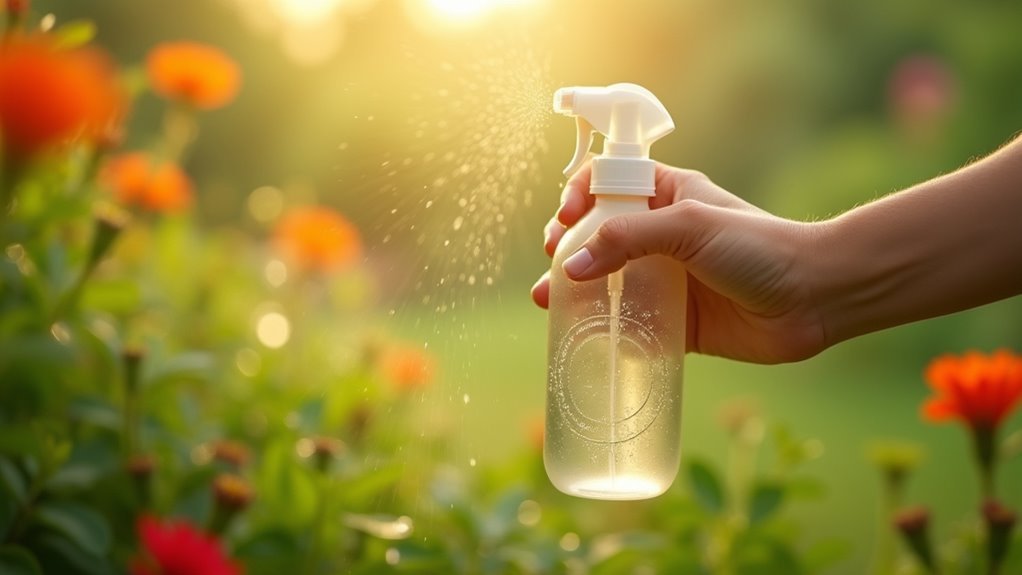You’ll find that properly formulated vinegar-based sprays can rival chemical repellents when you combine apple cider vinegar with essential oils like citronella, lemongrass, or peppermint. A 2:1 vinegar-to-water ratio with 3-5 drops of essential oil per cup creates an effective barrier that masks your scent from mosquitoes. While these natural alternatives cost under $1 per batch and avoid harsh chemicals, they require reapplication every 1-2 hours compared to DEET’s 12-hour protection, making proper formulation techniques essential for ideal effectiveness.
How Vinegar Disrupts Mosquito Behavior and Attraction

While commercial mosquito sprays dominate store shelves, vinegar offers a surprisingly effective natural alternative that works by disrupting the very signals mosquitoes use to find you.
The acetic acid in vinegar masks your natural scent markers—sweat, body heat, and carbon dioxide—that normally draw mosquitoes to their target. When you apply diluted vinegar to your skin, it alters your chemical signature, making you considerably less detectable to these pests.
Vinegar’s acetic acid disrupts the chemical signals mosquitoes rely on to locate human targets, effectively masking your natural scent markers.
Apple cider vinegar proves particularly effective at disrupting mosquito attraction patterns. Its strong odor creates an invisible barrier that confuses their sensory receptors.
While vinegar alone won’t provide complete protection, it serves as an excellent foundation for natural repellent strategies, especially when combined with other mosquito-deterring methods for thorough coverage.
White Vinegar Vs Apple Cider Vinegar for Mosquito Control
When choosing between white vinegar and apple cider vinegar for mosquito control, you’ll find that both options offer natural protection, though they differ in potency and application methods.
Apple cider vinegar contains higher acetic acid levels, making it slightly more effective as a mosquito repellent than white vinegar. Both varieties work by masking scents that attract mosquitoes with their strong odors.
You’ll need to dilute either vinegar with water before applying directly to your skin, watching for potential irritation.
While these natural alternatives are environmentally safer than chemical repellents, they require frequent reapplication for continued protection.
Apple cider vinegar’s enhanced effectiveness makes it the better choice, though neither provides the long-lasting protection of DEET-based products.
Essential Oil Combinations That Boost Vinegar Repellent Power

You can considerably amplify vinegar’s mosquito-repelling power by adding specific essential oils that create synergistic effects.
Citronella oil mixed with vinegar doesn’t just add fragrance—it masks your natural scent while providing dual-action protection that lasts longer than vinegar alone.
The key lies in understanding which oils like lemongrass and peppermint work best with vinegar, and getting the ratios right to maximize their combined effectiveness.
Citronella Vinegar Blend Benefits
Although citronella oil has earned its reputation as a natural mosquito deterrent, combining it with vinegar creates a markedly more powerful repellent that outperforms citronella alone. The acetic acid disrupts mosquitoes’ scent receptors, making it harder for them to locate you, while citronella masks your human odors.
| Benefit | Citronella Alone | Citronella + Vinegar |
|---|---|---|
| Protection Duration | 2-3 hours | Several hours |
| Effectiveness | Moderate | Enhanced |
| Shelf Life | Limited | Extended |
| Mosquito Deterrence | Good | Superior |
| Cost Efficiency | Standard | Higher value |
This powerful combination provides longer-lasting protection against mosquitoes than using citronella oil by itself. The vinegar also acts as a natural preservative, extending your repellent’s shelf life while maintaining its mosquito-fighting effectiveness.
Lemongrass Oil Synergy Effects
Building on the success of citronella and vinegar combinations, lemongrass oil creates an even more potent synergy that amplifies your repellent’s mosquito-fighting power.
When you combine lemongrass oil with other essential oils like eucalyptus, you’ll create a stronger barrier that considerably enhances vinegar-based mosquito repellents.
The secret lies in lemongrass oil’s high citronellal content, which effectively masks human scents that attract mosquitoes.
This combination extends your protection time compared to vinegar alone, reducing the need for frequent reapplication.
You’ll enjoy hours of effective mosquito deterrence while benefiting from a more pleasant aroma.
These essential oil blends make natural repellents more appealing without compromising effectiveness, giving you a powerful alternative to chemical-based products.
Peppermint Enhancement Ratios
When peppermint oil joins forces with vinegar, you’ll discover that proper ratios make the difference between a mediocre repellent and a mosquito-fighting powerhouse.
Research shows that a 1:3 ratio of peppermint oil to vinegar optimizes repellent properties while maintaining pleasant scent for human use. This combination works by creating a potent aroma that masks your natural scent, making it harder for mosquitoes to track you down.
Essential oils like peppermint enhance vinegar’s limited protective abilities, extending the duration of repellent effects considerably.
You’ll get a natural alternative to chemical-based products that’s generally safe for topical application when properly diluted. Remember to test on sensitive skin first, as concentrated peppermint can cause irritation in some individuals.
Proper Dilution Ratios for Safe and Effective Vinegar Sprays

You’ll need to get your vinegar concentration just right to create an effective mosquito repellent that won’t irritate your skin or damage surfaces.
Start with a basic 1:1 ratio of vinegar to water, which provides solid mosquito-repelling power while remaining gentle enough for regular use.
If you’re dealing with heavy mosquito activity, you can increase the potency by using a 2:1 vinegar-to-water ratio, but always test this stronger mixture on a small area first.
Vinegar Concentration Guidelines
Two key factors determine vinegar spray effectiveness: proper dilution ratios and consistent application timing. You’ll achieve peak mosquito deterrence by mixing equal parts vinegar and water. Apple cider vinegar works better than white vinegar due to its milder scent.
| Vinegar Type | Water Ratio | Essential Oils | Effectiveness |
|---|---|---|---|
| Apple Cider | 1:1 | 3-5 drops citronella | High |
| White Vinegar | 1:1 | 3-5 drops eucalyptus | Medium-High |
| Apple Cider | 1:2 | None | Medium |
| White Vinegar | 1:2 | None | Low-Medium |
You can enhance your spray’s potency by adding citronella or eucalyptus essential oils. Reapply every few hours for continued protection. Always test the mixture on a small skin patch first to prevent adverse reactions.
Safety Mixing Ratios
Although vinegar sprays offer natural mosquito protection, achieving the right balance between effectiveness and safety requires careful attention to dilution ratios.
When preparing your safety mixing ratios, follow these guidelines:
- Start with 1:1 ratio – Mix equal parts distilled white vinegar and water for effective repellency.
- Test before full application – Apply on small skin areas first to check for adverse reactions.
- Add essential oils sparingly – Use 5-10 drops per cup of vinegar mixture to enhance effectiveness.
- Consider skin sensitivity – Increase water ratio if you have delicate skin or allergies.
While stronger 2:1 vinegar concentrations boost potency, they increase irritation risks.
Always prioritize skin safety over maximum strength. Apply evenly on exposed skin and clothing, avoiding delicate fabrics that vinegar’s acidity might damage.
Application Methods for Maximum Mosquito Protection Coverage
When protecting yourself from mosquitoes, proper application technique makes the difference between effective coverage and getting bitten in missed spots. For maximum coverage, you’ll need to apply repellents evenly across all exposed skin, rubbing thoroughly to eliminate gaps. Don’t forget areas like ankles, wrists, and behind ears where mosquitoes commonly target.
| Application Method | Coverage Area | Reapplication Time |
|---|---|---|
| DEET/Picaridin | All exposed skin | 4-8 hours |
| Permethrin clothing | Treated garments | Pre-treatment required |
| Combination approach | Skin + clothing | Variable timing |
| Child application | Hands first method | Adult supervision |
| Sensitive areas | Avoid eyes/mouth | Careful placement |
You should reapply chemical repellents every 4-8 hours, especially after sweating or swimming. For enhanced protection, combine skin repellents with permethrin-treated clothing that’s completely dried before wearing.
Duration of Protection: How Long Vinegar Repellents Last
While vinegar-based repellents offer a natural alternative to chemical options, they fall markedly short in protection duration.
You’ll find these natural solutions typically protect you for only 30 minutes to 2 hours, requiring frequent reapplication throughout your outdoor activities.
Understanding vinegar’s limitations helps you make informed decisions:
Knowing vinegar’s protective shortcomings allows you to choose the most effective mosquito repellent for your specific outdoor needs.
- Duration of protection ranges from 30 minutes to 2 hours maximum
- Frequent reapplication becomes necessary in high mosquito activity areas
- Chemical repellents like DEET offer up to 12 hours of continuous protection
- Masking effect relies on strong odor rather than proven active ingredients
While vinegar provides short-term relief, it can’t match EPA-approved repellents’ longevity.
You’ll need to weigh convenience against effectiveness when choosing your mosquito protection strategy.
Comparing Vinegar Effectiveness Against Chemical Repellents
The stark difference in protection duration highlights a broader gap between vinegar and chemical repellents’ overall effectiveness.
When you compare vinegar to DEET or picaridin, the results are clear-cut. DEET provides up to 12 hours of proven protection, while vinegar offers only short-term, limited effectiveness that requires constant reapplication.
You’ll find that chemical repellents undergo rigorous EPA testing and registration, ensuring their safety and efficacy.
Vinegar lacks this scientific validation. While it’s generally safe for your skin, vinegar simply can’t match the reliable, long-lasting protection that established chemical formulations deliver.
If you’re seeking effective mosquito control, EPA-registered repellents remain your best option.
Vinegar might provide temporary relief, but it’s not a scientifically proven substitute for purpose-built mosquito repellents.
Safety Considerations for Skin and Environmental Use
Although effectiveness matters most when choosing mosquito repellents, you can’t overlook safety considerations that affect both your skin and the environment around you.
While effectiveness remains the primary concern in repellent selection, safety factors for both personal health and environmental impact cannot be ignored.
When evaluating repellent safety, consider these key factors:
- Skin compatibility – Picaridin causes less skin irritation than DEET and won’t damage synthetic materials or fabrics.
- Age restrictions – Natural options like oil of lemon eucalyptus shouldn’t be used on children under 3 years old.
- EPA registration – Choose products that’ve undergone rigorous safety testing for both skin application and environmental use.
- Application frequency – Essential oils require more frequent reapplication, increasing potential exposure risks.
DEET’s effectiveness comes with trade-offs including possible skin irritation and material damage.
Picaridin offers comparable protection without these concerns, making it safer for regular use.
Cost Analysis of Homemade Vinegar Vs Store-Bought Repellents
Beyond safety concerns, budget-conscious consumers often wonder whether homemade vinegar repellents can match store-bought alternatives in both cost and performance.
While homemade vinegar costs less than $1 per batch, this cost analysis reveals a misleading economy. Store-bought repellents containing 20% picaridin or 25% DEET range from $10 to $21 but provide up to 12 hours of protection.
Your vinegar mixture requires frequent reapplication and offers limited effectiveness against mosquitoes and ticks.
Research shows commercial repellents considerably outperformed homemade options in field tests.
Though you’ll spend more upfront on store-bought repellents, their proven effectiveness makes them a more reliable investment.
The lower efficacy of homemade vinegar could ultimately cost you more through increased health risks and discomfort from insect bites.
Frequently Asked Questions
What Is the Most Effective Mosquito Spray?
You’ll find DEET remains most effective overall, but picaridin offers comparable protection for twelve hours without damaging fabrics. New cyclic acetal formulations show promise, providing over 95% protection for eight hours.
How to Get Rid of Mosquitoes Without Using Chemicals?
You can eliminate mosquitoes by removing standing water, using essential oils like lavender, installing mosquito nets and screens, setting up outdoor fans, and placing traps around your yard naturally.
Which Is Better, DEET or Permethrin?
You can’t directly compare DEET and permethrin since they serve different purposes. Use DEET on your skin for immediate protection, while you’ll treat clothing with permethrin for long-lasting gear protection.
What Do Professionals Use to Keep Mosquitoes Away?
Professionals use Picaridin and DEET repellents for personal protection, permethrin-treated clothing, allethrin devices for mosquito-free zones, and integrated pest management including eliminating standing water and introducing natural predators.
In Summary
You’ve discovered that vinegar-based repellents can effectively compete with chemical alternatives through strategic application and enhancement. While they won’t match DEET’s longevity, you’ll get 2-4 hours of protection with proper dilution and essential oil boosters. You’re choosing a safer, eco-friendly option that’s gentler on your skin and wallet. For best results, you’ll need to reapply more frequently, but you’re avoiding harsh chemicals while maintaining reliable mosquito protection.





Leave a Reply